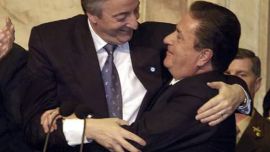Given the recent flurry of stirring domestic incidents, Argentines could easily be forgiven for losing sight of the political drama unfolding across their northeastern border, and for failing to ask questions that are obviously central to the region’s stability.
Is Brazil doing OK? Is Latin America’s largest democracy really on the verge of collapse? Will this Sunday’s election result prompt incumbent President Jair Bolsonaro to invent a mandate and emerge as the iron-fisted despot his opposition has long accused him of being?
“Already in 2018, he said that there was voter fraud and that he should have won in the first round; the breadcrumbs are all over the place that he will not gracefully accept defeat,” Gustavo Ribeiro, a journalist and the founder of The Brazilian Report, told the Times.
“Some people have made a false equivalency that Brazil is choosing between two similar populists with a track record of corruption. There may have been corruption during both presidencies, but only one of them threatens to stage a coup,” he added.
The other one, whether we like him or not, has always respected democracy and institutions. Lula always said that his convictions were illegitimate, but he did not seek refuge in an embassy; he went to prison. So you can’t really say the two are cut from the same cloth.”
Four years ago, Luiz Inácio Lula da Silva was sitting in a cell, beginning a 12-year sentence for his involvement in Brazil’s notorious Operation ‘Lava Jato’ (“Car Wash”) corruption scandal. Today, polling indicates he will win the presidential election and reoccupy the nation’s top office for a third term.
The criminal investigation that resulted in Lula’s conviction proved incredibly controversial amongst Brazilians. Overseen by then-federal judge Sergio Moro – an eventual justice minister in Bolsonaro’s Cabinet – the probe resulted in the conviction of some of Brazil’s most prominent businessmen and politicians.
Most consequentially for the nation’s political landscape, it disqualified Lula from running in the 2018 election under the auspices of the same anti-corruption legislation he signed into law in 2010.
A 2021 Supreme Court ruling has since determined that Moro’s court lacked jurisdiction and acted inappropriately, annulling the convictions, restoring Lula’s political rights and clearing the way for another run for the highest office.
Rupture repaired?
Given the extent of Brazil’s economic and political influence, Sunday’s contest will have wider consequences for Latin America – not only for democratic integrity but also less colourful matters like trade and diplomacy.
No regional capital will be watching events more closely than Buenos Aires. In recent years, with ties between Bolsonaro and President Alberto Fernández strained, Argentina’s most important bilateral relationship has been characterised by quarrels rather than collaboration.
“Ties have seen the biggest rupture since the historic rapprochement of the 1980s,” political scientist Oliver Stuenkel told the Times. “The Bolsonaro government has consistently used the bilateral relationship to demonise Argentina and thereby mobilise the most radical segment of Bolsonarismo.”
A win for Lula is likely to change that. The 76-year-old former president has historically enjoyed a close relationship with Kirchnerism, holding office during the presidencies of both Nestor Kirchner and Cristina Fernández de Kirchner. There is every reason to believe that his election would stimulate a much more active and amicable Argentine-Brazilian relationship than currently exists and perhaps the adoption of a more assertive foreign policy by President Fernández’s government.
“Fernández would feel emboldened by a Lula victory,” said Benjamin Gedan, Deputy Director of the Wilson Center’s Latin American Program.
“Early in Fernández’s term, conservatives held power in Chile, Bolivia, Brazil, Paraguay and Uruguay. Now, he sees friendly faces in presidential palaces throughout Latin America, including in Santiago and La Paz,” explained the former South America director on the National Security Council at the White House.
“Fernández already has strong ties to Mexican President Andrés Manuel López Obrador, and a similar relationship with the Brazilian leader would be consequential for the Casa Rosada,” he concluded.
“A Lula victory may help legitimate some of the contradictory positions that Fernández has had up until now,” geopolitical analyst Andrei Serbin Pont told the Times.
“It may reinforce the more [Nicolás] Maduro-aligned positions, for example,” said the expert, referring to the Venezuelan leader. “It may reinforce the more anti-imperialistic rhetoric. But that’s really going to be conditioned on what kind of Lula administration we have.”
“During his presidency, Lula did manage to maintain good relations with the United States, despite the anti-interventionist messaging. Likewise, the United States did see Brazil as a partner during the Lula presidency – a partner that it could delegate regional leadership functions to,” considered Serbin Pont, the director of the CRIES think-tank.
A new Mercosur?
Various members of the ruling Frente de Todos coalition in Argentina have voiced their support for Lula. Just last week Buenos Aires Province Governor Axel Kicillof hailed the former Brazilian leader at an event in La Plata.
“All of his programmes were directed to get the country out of backwardness and poverty. He was a fundamental man for Latin America and Argentina,” assured the former economy minister.
But despite championing a political agenda that has important commonalities with that of Kirchnerism, a Lula victory may also produce discord between Buenos Aires and Brasília apropos the future direction of the Mercosur trade bloc, a grouping that also includes Paraguay and Uruguay.
“Lula’s return to power would strengthen Argentina’s relationship with Brazil, but it would not overcome all divisions in Mercosur,” Gedan told the Times. “Uruguay is pursuing a unilateral free-trade agreement with China, expressed interest in a similar deal with the United States, and is considering whether to join the Trans-Pacific Partnership.”
He continued: “The Brazilian election will not alter Uruguay’s approach. It is not even clear Brazil and Argentina would see eye-to-eye on Mercosur should Lula defeat Bolsonaro. Argentina’s government has adopted a protectionist trade strategy.”
On Wednesday, Lula announced in a radio interview that he intends to bolster agricultural and industrial exports to Europe, vowing to revisit the long-delayed free-trade agreement with the European Union within the first six months of regaining the presidency.
The historic deal, agreed in 2019 when Mauricio Macri was Argentina’s president, never entered into force, with unrest on both sides of the Atlantic.
“It is not clear how Fernández would take advantage of these regional dynamics, as his foreign policy is often incoherent,” Gedan added.
Indeed, there is reason to believe the failure for Brazil and Argentina to liaise effectively on multilateral issues may have less to do with the former than the latter, as the disparate factions of the ruling coalition have consistently voiced incongruous views.
“There’s a lack of cohesion in Argentina’s current foreign policy, which has become highly segmented and siloed,” agreed Serbin Pont. “This makes it very difficult to make any coordinated, long-term strategic decisions.”
And ultimately, the degree to which any personal alliances are developed may be tempered by the proximity of Argentina’s own presidential contest in 2023.
“There are elections coming up in Argentina” next year, observed Stuenkel. “The Brazilian government doesn’t necessarily want to brand itself as a Fernández ally, in order not to complicate potential ties to a different government, should the current one not be re-elected.”



















Comments